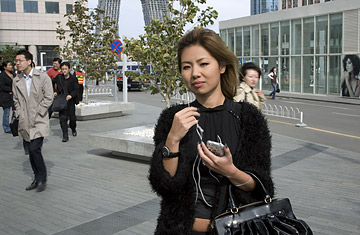
Wendy Ye's customized crystal-encrusted iPhone is at hand as she strolls through Beijing's SoHo district.
(3 of 3)
Ye adds that another reason she has found her niche is that Western luxury brands are mostly selling bags and shoes in China. She counts among her favorites Fendi, Valentino and Chanel. And among fashionistas trying to convey their insider knowledge, below-the-radar names like Loro Piana and Bottega Veneta are desirable. "Louis Vuitton is for girls from second-tier cities now," she says, deeming the company old news because it has been in China for more than a decade. Indeed, Louis Vuitton has been so successful here that its name is used as a generic term for luxury.
At 31, Jessica Zhang is a little older than the Me generation, but she identifies with what the twentysomethings are achieving. Zhang, who helms the Beijing branch of Quintessentially, a global concierge business, is the daughter of a doctor and a teacher from Changchun in northeast China. She learned English herself, eventually saving enough to tour Thailand and seven European cities. "I sat in small cafés, and I watched people. My English was not good, I had very little money, and I was lonely," she says. "I thought then I would live abroad, but now everyone is focused on China, so I'm here."
Quintessentially Beijing is basically a finishing school for the new rich. "We educate our members in a nice way," she says. "They want to learn what fork to use, what wine to choose." She might accompany clients to Fauchon, the French luxury-food emporium that opened a three-story outpost in Shin Kong Place, one of Beijing's glittering luxury malls. Fauchon, where everything—from the glazed éclairs to the brioche—is exactly comme en France, also holds regular "how to" evenings. "We explain you don't put mustard in coffee," says Natalie Monlezun, Fauchon's marketing manager. "French tastes are so very new here.They don't know what goes with what."
Across town is Beijing's new Seasons Place shopping center, where the anchor tenant is a Lane Crawford store, currently the Hong Kong retailer's only beachhead in mainland China. Inside the store is a surprise—not just because the interior features art installations that would make even the most rarefied of U.S. retailers start thinking of upping their game—but because of the labels on the racks: Maison Martin Margiela, Vanessa Bruno, Rick Owens. "We don't even have Rick Owens in Hong Kong!" says Bonnie Brooks, president of the Lane Crawford Joyce Group. "The speed at which this level of sophistication has been reached here is something that has surprised us. Young Beijingers are now so fashion savvy, they already want the not-so-showy labels."
They also want private clubs to go with their "insider" labels. One such place is the Lan Club, a 60,000-sq-ft. (5,600 sq m) Philippe Starck-designed dining space that is a favorite among Beijing's wealthy hipsters. When Zhang's clients want to book a private room here, she calls owner Danny Wang. A handsome man-about-town, Wang is the Ian Schrager of Beijing. His next glossy project, which should be finished by the time the Olympics get under way, is the city's first cutting-edge designer hotel.
Although Wang talks about being caught up in the communist-capitalist boom, he has a dream that stretches beyond the rampant consumerism that has captivated his generation. "One or two years ago, I thought this would never be possible," he says. And he is not talking about an even bigger restaurant or another collaboration with Starck but rather a project that entails building a free hospital for those left behind in China's dazzling boom.
"Those of us with wealth have responsibility," says Wang, who thinks the current consumer obsession is the natural first flush of excitement. "Our future cannot just be about that. It must be about combining wealth with a meaningful life."